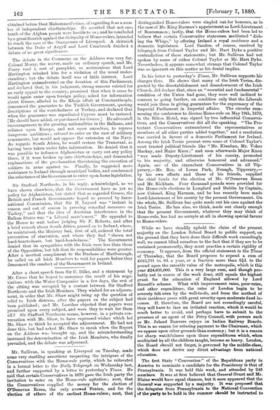In his letter to yesterday's Times, Mr. Sullivan supports his
charges thus. He shows that many of the Irish Tories, dis- gusted by the disestablishment and disendowment of the Irish Church, did declare that, since an "essential and fundamental" condition of the Union had gone, they were well inclined to consent to going further, on condition only that the Liberals would join them in giving guarantees for the supremacy of the Imperial Parliament in Imperial affairs. The circular sum- moning the conference to discuss Home-rule on May 19th, 1870, in the Bilton Hotel, was signed by two influential Conserva- tives, and the Conservatives did all the speaking. "The Pro- testant Conservatives outnumbered the representatives or members of all other parties added together," and a resolution was carried in favour of a domestic Parliament for Ireland. Among the Irish Tories present were some of Colonel Taylor's most trusted political friends like "Mr. Kinahan, Mr. Yokes Mackay, and Major Knox ;" and soon afterwards Major Knox "was made Deputy-Lieutenant of his county-, promoted to his majority, and otherwise honoured and advanced." Again, one of the staunchest Conservatives in all Tip- perary,—Mr. Roe, of Loran Park, Nenagh, Tipperary,— by his own efforts and those of his friends, supplied the chief funds for the election of Mr. O'Donovan Rossa and Mr. Kickham. Four thousand pounds were provided for the Home-rule elections in Longford and Dublin by Captain, now Colonel, King Harman, and he has recently been made Lord-Lieutenant of his county by the present Government. On the whole, Mr. Sullivan has quite made out his case against the Irish Tories. He has also, we think, made out clearly enough that the present Government, whatever they may think of Home-rule, has had no scruple at all in showing special favour to Home-rulers.


































 Previous page
Previous page